
Elektra Records is an American record label owned by Warner Music Group, founded in 1950 by Jac Holzman and Paul Rickolt. It played an important role in the development of contemporary folk and rock music between the 1950s and 1970s. In 2004, it was consolidated into WMG's Atlantic Records Group. After five years of dormancy, the label was revived as an imprint of Atlantic in 2009. In October 2018, Elektra was detached from the Atlantic Records umbrella and reorganized into Elektra Music Group, once again operating as an independently managed frontline label of Warner Music. In June 2022, Elektra Music Group was merged with 300 Entertainment to create the umbrella label 300 Elektra Entertainment (3EE), though both Elektra and 300 continued to maintain their separate identities as labels.

L.A. Woman is the sixth studio album by the American rock band the Doors, released on April 19, 1971, by Elektra Records. It is the last to feature lead singer Jim Morrison during his lifetime, due to his death exactly two months and two weeks following the album's release, though he would posthumously appear on the 1978 album An American Prayer. Even more so than its predecessors, the album is heavily influenced by blues. It was recorded without producer Paul A. Rothchild after he quit the band over the perceived lack of quality in their studio performances. Subsequently, the band co-produced the album with longtime sound engineer Bruce Botnick.

Nonesuch Records is an American record company and label owned by Warner Music Group, distributed by Warner Records, and based in New York City. Founded by Jac Holzman in 1964 as a budget classical label, Nonesuch has developed into a label that records critically acclaimed music from a wide range of genres. Robert Hurwitz was president of the company from 1984 to 2017.
Paul Henry Beaver Jr. was an American musician who was a pioneer in popular electronic music, using the Moog synthesizer. From 1967, Beaver collaborated with Bernie Krause as the recording duo Beaver & Krause.

Jac Holzman is an American music businessman, the founder, chief executive officer and head of record label Elektra Records and Nonesuch Records. Holzman helped commercially launch the CD and home video formats, as well as the pilot program which became MTV. He was inducted into the Rock and Roll Hall of Fame in 2011.

Delaney & Bonnie was an American duo of singer-songwriters Delaney Bramlett and Bonnie Bramlett. In 1969 and 1970, they fronted a rock/soul ensemble, Delaney & Bonnie and Friends, whose members at different times included Duane Allman, Gregg Allman, Eric Clapton, George Harrison, Leon Russell, Bobby Whitlock, Dave Mason, Steve Howe, Rita Coolidge, and King Curtis.

Da Capo is the second studio album by American rock band Love, released in November 1966 by Elektra Records. The album was recorded during September and October 1966 at RCA Studios in Hollywood, California, with the exception of lead single "7 and 7 Is", recorded the previous June. The single was a departure for the band and became their highest charting, reaching No. 33 on the Billboard Hot 100. Despite the success of "7 and 7 Is", a string of well received live performances at the time and contemporary critical acclaim for the album upon its release, it peaked at No. 80 on the Billboard 200.
Mark Kerner Abramson was an American record producer and artist. He produced recordings of Judy Collins, The Paul Butterfield Blues Band, Bob Gibson, Love, Phil Ochs, Tom Rush, Judy Henske, Josh White, The Wackers and many other artists.
Gavan Daws is an American writer, historian and filmmaker residing in Honolulu, Hawaii. He writes about Hawaii, the Pacific, and Asia. He is a retired professor of history at University of Hawaii at Manoa.

13 is the first compilation album by American rock band the Doors, released by Elektra Records on November 30, 1970. The title refers to the thirteen tracks included, which feature a variety of songs from their five studio albums released up to that point. The cover shrink wrap featured a clear sticker that read: "A Collection of Thirteen Classic Doors Songs". It is the band's only compilation album released while lead singer Jim Morrison was alive.
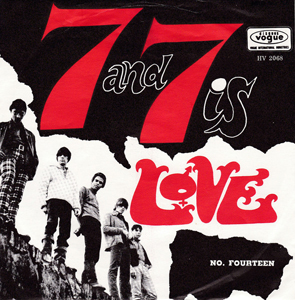
"7 and 7 Is" is a song written by Arthur Lee and recorded by his band Love on June 17 and 20, 1966, at Sunset Sound Recorders in Hollywood. It was produced by Jac Holzman and engineered by Bruce Botnick.
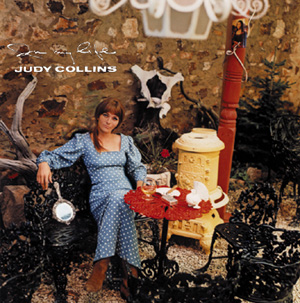
In My Life is the fifth studio album by the American singer and songwriter Judy Collins, released by Elektra Records in 1966. It peaked at No. 46 on the Billboard Pop Albums charts in 1967.

Fifth Album is the fourth studio album by American singer and songwriter Judy Collins, released by Elektra Records in 1965. It peaked at No. 69 on the Billboard Pop Albums chart.

What's Shakin' is a compilation album released by Elektra Records in May 1966. It features the earliest studio recordings by the Lovin' Spoonful and the Paul Butterfield Blues Band, as well as the only released recordings by the ad hoc studio group Eric Clapton and the Powerhouse, until they were reissued years later.

The Original Delaney & Bonnie, also known by its subtitle Accept No Substitute, is the second studio album by American recording duo Delaney & Bonnie. It was recorded with many of the "friends" that would form the core of their best-known 1969–70 touring band, including Bobby Whitlock, Carl Radle and Rita Coolidge.
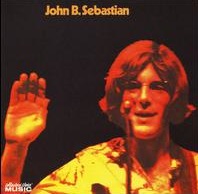
John B. Sebastian is the debut album by American singer-songwriter John Sebastian, previously best known as the co-founder and primary singer-songwriter of the 1960s folk-rock band the Lovin' Spoonful. The album, released in January 1970, includes several songs that would become staples of Sebastian's live performances during the early and mid-1970s. Most notably, the album included "She's a Lady", Sebastian's first solo single, and an alternate version of "I Had a Dream" which was used to open the soundtrack album of the 1970 documentary film Woodstock. John B. Sebastian also featured support performances by David Crosby, Stephen Stills and Graham Nash several months before that trio agreed to work together as a performing unit.
A sampler or promotional compilation is a type of compilation album generally offered at a reduced price to showcase an artist or a selection of artists signed to a particular record label. The format became popular in the late 1960s as record labels sought to promote artists whose works were primarily available in album rather than single format, and therefore had little opportunity to gain exposure through singles-dominated radio airplay. Most samplers showcased already-released material, so that as they sampled artists they also sampled the albums from which their tracks were drawn. The term 'album sampler' is also used in cases where an album is distributed among multiple records in case of, for example, vinyl where the maximum play time is less than the length of the full album. In these cases, album sampler titles may be added to each vinyl.
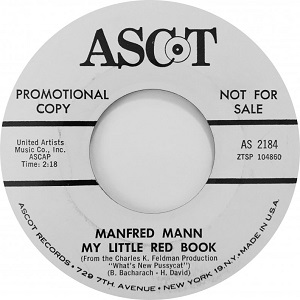
"My Little Red Book" (occasionally subtitled "(All I Do Is Talk About You)") is a song composed by American songwriter Burt Bacharach with lyrics by Hal David. The duo was enlisted by Charles K. Feldman to compose the music to Woody Allen's film What's New Pussycat? following a chance meeting between Feldman and Bacharach's fiancée Angie Dickinson in London. "My Little Red Book" was composed in three weeks together with several other songs intended for the movie. Musically, the song was initially composed in the key of C major, largely based on a reiterating piano riff performed. David's lyrics tells the tale of a distraught lover, who after getting dumped by his girlfriend browses through his "little red book" and taking out several girls to dance in a vain effort to get over her.
William Stanley Harvey was an American graphic designer and art director, responsible for the design of Elektra Records' logos and many of its album covers between the 1950s and 1970s including those by Love, The Doors, MC5, The Stooges, Judy Collins, Tim Buckley and others.
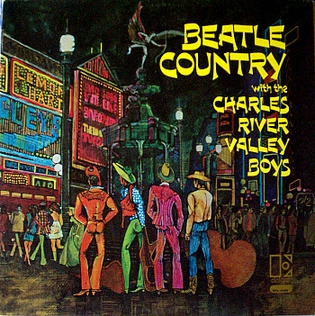
Beatle Country is the fourth and final studio album by the American bluegrass band Charles River Valley Boys, released in November 1966 by Elektra Records. Where the Charles River Valley Boys' previous albums consisted of traditional and new bluegrass and some early country songs, Beatle Country contains only covers of the Beatles. The band and several session musicians completed the album at Columbia's studio in Nashville, Tennessee, across four days in September 1966. Paul A. Rothchild and Peter K. Siegel produced the album, with Glenn Snoddy as audio engineer.















